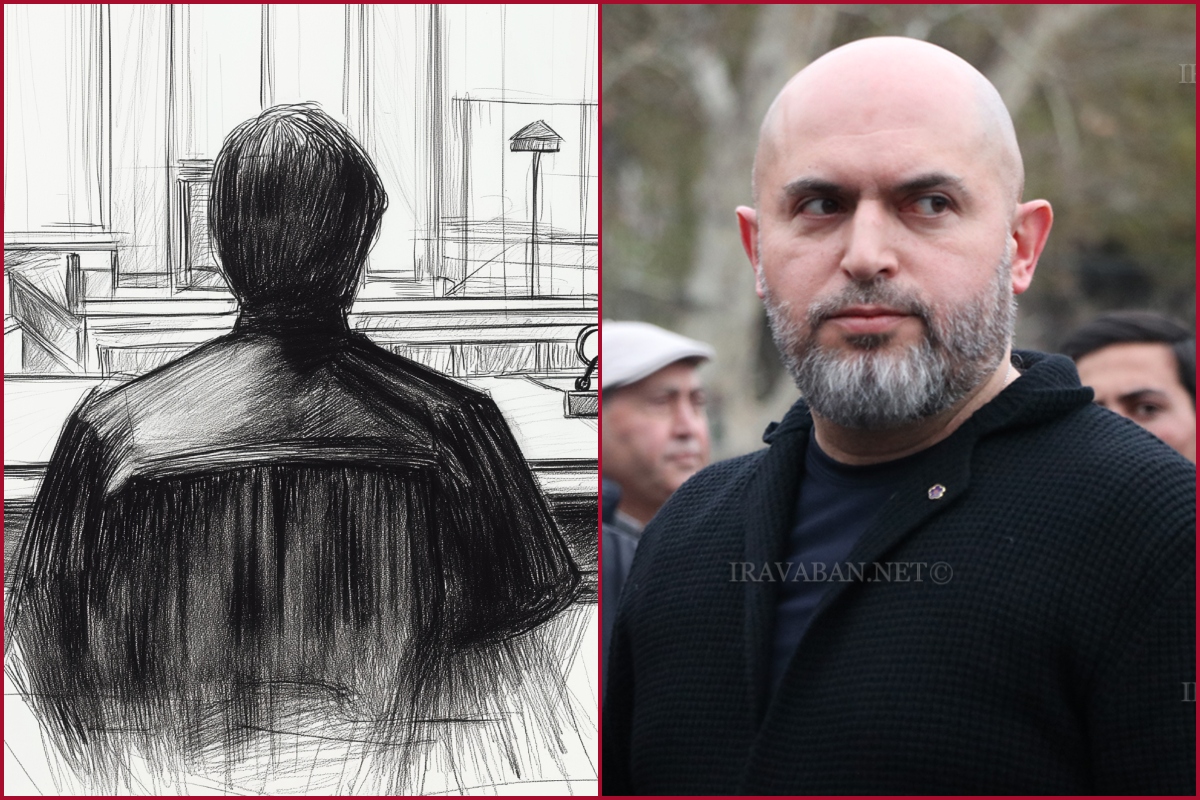Introduction
The case of politician Armen Ashotyan has become a vivid example of systemic issues related to detention practices in Armenia. This analytical article presents the development of the case in three phases, revealing the problems associated with the application of detention. Iravaban.net journalists have studied three complaints submitted by the defense and analyzed their content.
Submitted Complaints
First complaint:
- Name: special review complaint
- Submission date: January 29, 2024
- Court: RA Anti-Corruption Court of Appeal
- Contested decision: Decision of the RA Anti-Corruption Court of January 8, 2024
- Defenders: Ruben Melikyan, Margar Soghomonyan, Habet Martirosyan
Second complaint:
- Name: special review complaint
- Submission date: March 19, 2024
- Court: RA Court of Cassation
- Contested decision: Decision of the RA Anti-Corruption Court of Appeal of February 26, 2024
- Defenders: Ruben Melikyan, Margar Soghomonyan, Habet Martirosyan
Third complaint:
- Name: special review complaint
- Submission date: April 25, 2024
- Court: RA Anti-Corruption Court of Appeal
- Contested decision: Decision of the RA Anti-Corruption Court of April 11, 2024
- Defenders: Ruben Melikyan, Habet Martirosyan
First Phase (June 2023 – January 2024) Case background:
- Arrest: June 15, 2023
- Criminal prosecution: under Article 38-308, Part 2, Article 38-179, Part 3, Point 1, and Article 38-190, Part 3, Points 1 and 3 of the former RA Criminal Code
- Court decision on detention: June 16, 2023
Main defense arguments:
- Violation of the substantiation of the procedural act
- Need to review the conditions of detention legitimacy
- Incorrect assessment of risks of obstructing the proceedings
- Disregard for the duration of detention
- Disregard for alternative preventive measures
- Violation of the maximum detention period
Analysis:
- Impact of previous Court of Appeal decisions: The defense argues that the Court of Appeal decisions of 28.09.2023 and 16.11.2023 should have led to a reassessment of Ashotyan’s risk of obstructing the proceedings.
- Consideration of detention duration: Reference is made to ECtHR case law (Clooth v. Belgium, 12.12.1991), which states that the risk of influencing witnesses usually decreases over time.
- Disregard for alternative preventive measures: The defense cites ECtHR cases Dolgova v. Russia (02.03.2006) and Purak v. Poland (12.02.2008).
- Need to review detention grounds: Reference is made to the Shirkhanyan v. Armenia case (22.02.2022).
Second Phase (January 2024 – February 2024) Case development: On January 8, 2024, the RA Anti-Corruption Court extended Ashotyan’s detention until April 15, 2024. On January 29, 2024, Ashotyan’s defenders submitted a special review complaint to the RA Anti-Corruption Court of Appeal.
New defense arguments:
- Absence of fact of obstructing the proceedings: The defense argues that there is no evidence in the case materials indicating Ashotyan’s illegal interference with the evidence-gathering process.
- Disregard for the essence of the guarantee institution: Reference is made to doctrinal literature and textbooks emphasizing that the essence and sole instrument of the guarantee is the guarantor’s authority.
- Unjustified rejection of house arrest: The defense cites Article 123 of the Criminal Procedure Code.
Third Phase (February 2024 – April 2024) Further case development: On February 26, 2024, the RA Anti-Corruption Court of Appeal upheld the Anti-Corruption Court’s decision of January 8, 2024. On March 19, 2024, Ashotyan’s defenders submitted a special review complaint to the RA Court of Cassation. On April 11, 2024, the RA Anti-Corruption Court again extended Ashotyan’s detention, this time until July 15, 2024. On April 25, 2024, the defenders submitted a new complaint to the RA Anti-Corruption Court of Appeal.
New defense arguments:
- Violation of Article 5, Paragraph 3 of the ECHR: The court failed to annul the part of the Anti-Corruption Court’s decision that contradicts ECtHR case law.
- Need to review detention grounds: The court did not reassess the probability of obstructing criminal proceedings.
- Incorrect interpretation of detention period calculation: The court did not justify the method of calculating the three-month detention period as defined by Article 119, Part 4 of the Criminal Procedure Code.
General Conclusions:
- Issue of substantiation of procedural acts: Courts do not adequately address the essential arguments of the defense.
- Disregard for ECtHR case law: Armenian courts often ignore the standards set by the ECtHR.
- Inadequate discussion of alternative preventive measures: Courts do not pay sufficient attention to alternative preventive measures.
- Disregard for the need to review detention grounds: Courts often fail to review detention grounds considering case developments.
- Problems with calculating detention periods: There are disagreements on calculating detention periods.
The case of politician Armen Ashotyan reveals systemic issues related to detention practices in Armenia. In particular, there is a tendency to extend detention periods too easily without proper justification and full discussion of alternatives. This practice contradicts the standards set by the ECtHR and may lead to new complaints against Armenia.
Legislative Improvement Proposals
Considering the aforementioned issues, the following legislative changes are proposed based on this analysis:
- Making the discussion of alternative detention measures mandatory:
- Proposal: Amend Article 116 of the Criminal Procedure Code to establish the courts’ obligation to justify the impossibility of applying alternative preventive measures.
- Justification: This change will promote the principle of detention as an exceptional measure and encourage more frequent use of alternative measures.
- Clarification of criteria and regulation of the procedure for reviewing detention grounds:
- Proposal: Supplement Article 118 of the Criminal Procedure Code by establishing a list of issues subject to mandatory consideration by the court when reviewing detention grounds, including: a) New circumstances that have emerged during the case examination, b) The defendant’s behavior during detention, c) The possibility of applying alternative preventive measures.
- Justification: This change will contribute to increasing the effectiveness of the review process and ensure periodic and substantiated review of detention grounds.
- Expansion of mandatory application of ECtHR case law:
- Proposal: Supplement Part 2 of Article 6 of the Constitutional Law “Judicial Code” by stating that “When interpreting the provisions enshrined in the Constitution regarding fundamental rights and freedoms in the administration of justice, the practice of bodies operating on the basis of international human rights treaties ratified by the Republic of Armenia is taken into account and applied.”
- Justification: This change will promote broader application of ECtHR standards and improve the compliance of Armenian judicial practice with international standards.
- Clarification of the methodology for calculating detention periods:
- Proposal: Supplement Article 119 of the Criminal Procedure Code by clearly defining the methodology for calculating detention periods, particularly the procedure for calculating the total duration of detention and maximum periods at different stages.
- Justification: This change will reduce disagreements on calculating detention periods and ensure legal certainty.
- Ensuring the substantiation and adversarial nature of detention decisions:
- Proposal: Supplement Article 288 of the Criminal Procedure Code by adding a new part that will establish the court’s obligation to examine and address in the decision the essential arguments of the defense when considering issues of applying or extending preventive measures. At the same time, establish criteria for which arguments should be considered essential.
- Justification: This change will ensure proper examination of defense arguments by the court, improve the quality of judicial acts, and contribute to the effective realization of the right to defense. It will expand judicial guarantees by ensuring the implementation of the adversarial principle in the process of applying preventive measures.
These proposals aim to improve detention practices in Armenia, ensuring the protection of human rights and compliance with international standards. They require careful discussion and development, taking into account current legislation, judicial practice, and international experience.
Practical Improvement Proposals
Along with legislative changes, improvements are also needed at the practical level. The following proposals can contribute to improving detention practices:
- Capacity development of the judicial system:
- Organize regular training for judges and prosecutors on ECtHR case law and international standards for applying detention.
- Conduct practical seminars on the application of alternative preventive measures.
- Introduction of monitoring and analysis mechanisms:
- Conduct periodic analysis of judicial decisions regarding detention.
- Publish annual reports revealing existing problems and best practices.
- Expansion of inter-agency cooperation:
- Organize regular discussions between judges, prosecutors, and lawyers.
- Develop joint guidelines on the application of detention and alternative measures.
- Application of technological solutions:
- Introduce electronic monitoring systems to increase the effectiveness of alternative preventive measures.
- Create a unified information database on the application of detention and alternative measures.
- Raising public awareness:
- Organize public discussions and educational events on detention application and human rights.
- Publish simplified guidelines for citizens on detention criteria and alternative measures.
These practical steps, combined with legislative changes, can contribute to a significant improvement in detention practices in Armenia and raise the level of human rights protection.
Conclusion
The case of politician Armen Ashotyan shows that detention practices in Armenia are still far from perfect. As mentioned above, systemic changes are needed at both legislative and practical levels. The proposed reforms can contribute to solving these issues and ensure a higher level of human rights in the criminal justice system.
It is important to continue monitoring and analyzing similar cases, as well as to follow the implementation and effectiveness of the proposed changes. Only through continuous attention and improvements will it be possible to achieve real reform of the justice system.
















